2013 年广西普通高中会考英语真题及答案
(全卷满分 150 分,考试时间 150 分钟)
注意事项:
1.答卷前,考生务必将密封线内的项目填写清楚,密封线内不要答题
2.用蓝、黑墨水钢笔或蓝、黑笔芯圆珠笔按各大题的要求作答。
第一部分:听力(共两节,满分 20 分)
第一节(共 5 小题,每小题 1 分)
听下面 5 段对话。每段对话后有一个小题,从题后所给的 A、B、C 三个选项中选出最佳选
项,并标在试卷的相应位置上,听每段对话前,你将有时间阅读各个小题,每小题 5 秒钟;
听完后,各小题将给出 5 秒钟的作答时间每段对话仅读一遍。
1. What is the probable relationship between the two speaks?
A. Classmates.
B. Workmates.
Why was the man late for work?
2.
C. Strangers.
A. He was in an accident.
B. His bike was being repared
C. He couldn’t get his car going.
3.
What is the man suggestion?
should be more careful next time.
A. The woman
B. They should think of a solution.
C. The woman should find another key.
What will the woman do this evening?
4.
A. Have a dinner with a friend.
B. Watch a ball game on TV.
C. Wait for a phone call.
5.
What is the present rice of the suitcase?
A. 25 dollars.
B. 35 dollars. C. 50 dollars.
第二节(共 15 题,每小题 1 分)
听下面 5 段对话或独白。每段对话或独白后有几个小题,从题中所给的 A、B、C 三个选项
中选出最佳选项,并标在试卷上。听每段对话前,你将有时间阅读各个小题,每小题 5 秒
钟;听完后,各小题将给出 5 秒钟的作答时间。每段对话读两遍。
听第 6 段对话,回答第 6--8 题。
6.
What is the man doing now?
A. He is playing tennis.
B. He is playing a computer game.
C. He is doing his homework.
Why can’t the man go tonight?
A. He isn’t interested in tennis.
B. He prefers computer games to tennis.
C. He has to take care of his brother.
Where the two speakers probably talking?
A. On the phone.
B. In the street.
7.
8.
听第 7 段对话,回答第 9--11 题。
9.
How many artists will show their paintings?
A. Two.
B. Three.
C. One.
10. When is the international exhibit?
C. In the school.
�
A. At 11 am on Saturday.
B. At 3 pm on Saturday.
C. At 3 pm on Sunday.
11. What can we learn from the conversation?
A. The local exhibit is in Building 8.
B. The international exhibit is in Building 4.
C. People can see paintings from other countries.
听第 8 段对话,回答第 12--14 题。
12. Why does the man want to meet Professor White?
A. To ask him questions about an experiment.
B. To meet him by appointment.
C. To invite him to an exhibition with him.
13. When will the man probably meet Professor White?
A. At four this afternoon.
B. At three this afternoon.
C. At two this afternoon.
14. What will the man have to give up?
A. Meeting Professor Hunter.
B. Going to the exhibition.
C. Meet Professor White.
听第 9 段对话,回答第 15--17 题。
15. What is the man’s problem?
A.He is drinking too much coffee.
B. He is too busy to have time for a rest.
C. He is too nervouse about the exam.
16. What does the woman think about the coffee?
A. It is helpful to one’s work.
B. It tastes better than soda.
C. It is harmful to one’s health.
17. When does the conversation probably take place?
A. In the morning .
B. In the afternoon .
C. In the evening
听第 10 段对话,回答第 18--20 题。
18. Who is Mary?
A. The speaker’s sister.
B. The speaker.
C. The speaker’s friend.
19. What does Tom usually do when he has something to decide?
A.He asks for advice and follows it.
B. He asks for advice but does the opposite.
C. He makes up his mind by himself.
20. How did Tom feel that when the speaker advised him not to accept the job offer?
A. Surprised
B. Satisfied.
C. Delighted.
第二部分:英语知识运用(共两节,满分 45 分)
第一节: 单项填空(共 15 小题;每小题 1 分,满分 15 分)
21. The wind has _____ a bit.
A . died down
B. died away
22. ---- Is this raincoat yours?
C. died out
D. died of
---- No, mine _____ there behind the door.
A. is hanging
C. hangs
B. has hung
D. hung
�
23. She is _______ today, because she got an “A” for her composition.
A. careful
B. cheerful
C.
useful
D . helpful
24. “Two months ___
too short a time,” he warned,“we must hurry up.”
A. are
B. were
C. is
D. have
25. Metal ______ electricity.
B. conduces
A. continues
C. conditions
D.conducts
26
I will _______you tomorrow afternoon.
A. call at
B.
call up
C. call back
D.call on
27. Crying, the girl tore ___ his letter.
A. up
B. off
C. down
D. away
28. His theory __
true.
A. is proved
B. was proved
C. proves
D. is proving
29.____students are playing on the playground. ____students there is at least over
100.
A.A number of; A number of
C.A number of; The number of
B. The number of; The number of
D. The number of; A number of
30. She had to take several jobs to ______ her debts.
A . pay back
B. pay off
D.
pay for
31.I didn’t hear the phone. I ___
C. pay down
asleep.
A. must be
C. should be
B. must have been
D. should have been
32. — Shall I tell John about it
— No, you _____. I’ve told him already.
A. needn’t
C. mustn’t
B. wouldn’t
D. shouldn’t
33. ---- Did you remember to give Mary the money you owed (欠) her?
---- Yes. I gave it to her ______ I saw her.
A. or
C. suddenly
B. the moment
D. since
34. People who go on
diet mustn’t have chocolate.
A. the
B. \
C. a
D this
35. The doctor and the nurses did all they could ___
the patient’s life.
A. save
C. to be saving
B. to save
D. to have saved
第二节:完形填空(共 20 小题;,每小题 1.5 分,满分 30 分)
阅读下面短文,掌握其大意,然后从 36--55 各题所给的四个选项(A、B、C 和 D)中,选
出最佳选项,并在答题卡上将该项涂黑。
Michel is a young girl who works for the police
a handwriting expert (专
many criminals (罪犯) by using her special talents (天
36
家). She has helped
才).
37
When she was fourteen, Michel was already
39
that she would spend hours
38
interested in the
40
them. After
two-year class in handwriting at the
differences in her friends'
41
School of Police Science.
college she went to France for a
42
Michel says that it is
discover 44
her own eyes,
kinds of paper and ink. This knowledge is often
of what she needs to know simply
46
she also has machines
43 for people to hide their handwriting. She can
looking at the writing with
different
great help to the police.
47 help her make
45
48
49
�
53
she fell in love with her future husband, a young policeman
50
of what kind of person the
51
I didn't like his handwriting. " She
54
B. letter
C. tongues
D. handwriting
B. studying
B. finishing
C. settling
C. starting
D. uncovering
D. stepping into
Michel believes that handwriting is a good
52
C. like
C. catch
C. quite
B. by
B. follow
B. too
is. "I wouldn't go out with a fellow
says. But she
she studied his handwriting. It is later proved to be
36
37
38
39
40
41
42
43
44
45
46
47
48
49
50
51
52
53
54
55
A. with
A. search
A. so
A. books
A.writing
A.attending
A. powerful
A.main
A. most
A. with
A. so
A. they
A. up
A. of
A. test
A. thief
A. whether
A. adds
A. before
A.necessary
B. by
B. for
B. in which
B. out
B. to
B. sign(标记)
B. criminal
B. unless
B. tells
B. after
B. all right
C. special
C. easy
C. little
C. of
C. thus
C. that
C. for
C. with
C. means
C. writer
C. if
B. natural
B. safe
B. nothing
55
, however.
D. as
D. judge
D. extra
D. common
D.impossible
D. sight
D. about
D. but
D. those
D. into
D. for
D. habit(习惯)
D. policeman
D. after
C. repeats
C. shyly
C.important
D. cries
D. and
D. quite easy
第三部分 阅读理解(20 小题,每小题 2 分,共 40 分)
A
It was Monday. Mrs Smith's dog was hungry, but there was not any meat in the
house.
Considering that there was no better way. Mrs Smith took a piece of paper, and
wrote the following words on it:“Give my dog half a pound of meat.”Then she gave
the paper to her dog and said gently:“Take this to the butcher(*person whose job
is selling meat). and he's going to give you your lunch today.”
Holding the piece of paper in its mouth, the dog ran to the butcher's. It gave
the paper to the butcher. The butcher read it carefully, recognized that it was
really the lady's handwriting and soon did it as he was asked to. The dog was very
happy, and ate the meat up at once.
At noon, the dog came to the shop again. It gave the butcher a piece of paper
again. After reading it. he gave it half a pound of meat once more.
The next day, the dog came again exactly at noon. And as usual, it brought a
piece of paper in the mouth. This time, the butcher did not take a look at the paper,
and gave the dog its meat, for he had regarded the dog as one of his customers (*people
who buy sth. from a shop).
But, the dog came again at four o'clock. And the same thing happened once again.
�
To the butcher's more surprise, it came for the third time at six o'clock, and brought
with it a third piece of paper. The butcher felt a bit puzzled. He said to himself,
“This is a small dog. Why does Mrs Smith give it so much meat to eat today?”
Looking at the piece of paper, he found that there were not any words on it!
56.Mrs Smith treated her little dog quite_________.
A.cruelly
B.fairly
C.kindly
D.friendly
57.It seemed that the dog knew well that the paper Mrs Smith gave it_______.
A.might do it much harm
B.could do it much good
C.would help the butcher
D.was worth many pounds
58.From its experience, the dog found that ________.
A.only the paper with Mrs Smith's words in it could bring it meat
B.the butcher would give the meat to it whenever he saw it
C.Mrs Smith would pay for the meat it got from the butcher
D.a piece of paper could bring it half a pound of meat
59.At the end of the story, you'll find that _______.
A.the dog was clever enough to write on the paper
B.the dog dared not go to the butcher's any more
C.the butcher was told not to give any meat to the dog
D.the butcher found himself cheated(*act in a way that is not honest)by the
clever animal
B
As you research music, you will find music that is familiar to you. You will
find music which tells of interesting places and exciting things to do.You will
find music which expresses feelings that are often your own.
Music is an expression of the people.As you research, you will find music of
people at work and play. You will find music expressing love of the country, love
of nature, and love of home.
Music is also an expression of the composer(作曲家).The composer expresses his
own musical ideas.He studies the materials of music and disovers ways of using them.
He looks for new kinds of musical expression.
Music can suggest actions and feelings which we all share. We can enjoy playing
and singing music, dancing and listening to the music of the people and the composers
of different times and places.
60.In the first paragraph,the author tells us to________.
A.find entertainment(娱乐)in music.
B.be friendly to music.
C.express your feelings in music
D.discover the things and places in music
61.From the second paragraph, we know that_________.
A.if we love music, we will love the country, nature and home
�
B.music sings of the country, nature and home
C.you may listen to music at work or at play
D.music can express how people live, work and think
62.By means of music, the composer wishes that__________.
A.you would study with them
B.you would share his feelings and ideas
C.you would express your own feelings
D.you help discover ways of using music and new kinds of musical expression
63.Which of the following statements is NOT TRUE. Music expresses________.
A.the feelings of our own
B.people´s love of the country
C.the composer´s feelings
D.people´s musical ideas
C
Miss Gogers taught physics in a New York school.Last month she explained to one
of her classes about sound, and she decided to test them to see how successful she
had been in her explanation. She said to them,“Now I have a brother in Los Angeles.If
I was calling him on the phone and at the same time you were 75 feet away, listening
to me from across the street, which of you would hear what I said earlier, my brother
or you and for what reason?”
Tom at once answered,“Your brother. Because electricity travels faster than
sound waves.”“That's every good,”Miss Gogers answered; but then one of the girls
raised her hand, and Miss Gogers said.“Yes, Kate.”
“I disagree,”Kate said.“Your brother would hear you earlier because when
it's 11 o'clock here it's only 8 o'clock in Los Angeles.”
64.Miss Gogers was teaching her class_________.
A.how to telephone
C.about time zone(时区)
B.about electricity
D.about sound
65.Miss Gogers raised this question because she wanted to know whether______.
A.it was easy to phone to Los Angeles
B.her student could hear her from 75 feet away
C.her students had grasped her lesson
D.sound waves were slower than electricity
66.Tom thought that electricity was _________.
A.slower than sound waves
B.faster than sound waves
C.not so fast as sound waves
D.as fast as sound waves
67.Kate thought Tom was wrong because _______.
A.clocks in Los Angeles showed a different time from those in New York
B.electricity was slower than sound waves
C.Tom was not good at physics at all
D.Tom's answer had nothing to do with sound waves
�
D
An old woman walked into a clothes shop.She asked the salesgirl to let her have
a look at a new dress,but the girl stood still behind the counter(柜台),taking no
notice of the request.The old woman spoke to the girl again,raising her voice a
bit,but still received no answer.The old woman looked at the girl and nodded to
herself,
“I am too old to see well.I can’t even tell a plastic model from a real girl!”
On hearing this,the salesgirl shouted to the old woman,“What? Did you call
me a plastic model?”The old woman was greatly surprised.“Oh,dear me,”she said.
“The model can speak!”
68.What did the old woman go to the shop to do?
A.To choose a dress.
C.To show off her dress.
B.To buy a dress for herself.
D.To pick a quarrel with the salesgirl.
69.The salesgirl did not make a reply __________.
A. because she didn’t see the old woman
B. because she didn’t think the old woman had enough money for a new dress
C. because she was too busy to notice the old woman
D. for some reason unknown in this story
70.It was not until that woman spoke for the _____ time that the salesgirl said
something.
A.first
B.second
C.third
D.fourth
71.When the old woman said,“I am too old to see well,”she _______.
A. meant to say that she really had poor eyesight
B. wanted the salesgirl to excuse her
C. was simply telling a lie
D. was ,in fact, trying to make the salesgirl open her mouth
E
Started in 1636, Harvard University is the oldest of all the many colleges and
universities in the United States. Yale,Princeton, Columbia and Dartmouth were
opened soon after Harvard.
In the early years, these school were much.alike(*similar).Only young men went
to college. All the students studied the same subjects,and everyone learned Latin,
Greek and Hebrew. Little was known about science then, and one kind of school could
teach everything that was known about the world. When the students graduated(*
毕业),most of them became ministers or teachers.
In 1782, Harvard started a medical school for young men who wanted to become
doctors. Later, lawyers could receive their training(*训练)in Harvard's law school.
In 1825, besides Latin and Greek, Harvard began teaching modern languages, such
�
as French and German. Soon it began teaching American history.
As knowledge increased, Harvard and other colleges began to teach many new
subjects. Students were allowed to choose the subjects that interested them.
Today, there are many different kinds of colleges and universities. Most of
them are made up of smaller schools that deal with(涉及)special fields of learning.
There's so much to learn that one kind of school can't offer it all.
72.The oldest university in the US is _________.
A.Yale
B.Harvard
C.Princeton
D.Columbia
73.From the second paragraph, we can see that in the early years,______.
A.those colleges and universities were the same
B.people, young or old, might study in the colleges
C.students studied only some languages and science
D.when the students finished their school, they became lawyers or teachers
74.Modern languages the Harvard taught in 1825 were ________.
A.Latin and Greek
B.Latin, Green, French and German
C.American history and German
D.French and German
75.On the whole, the passage is about___________.
A.how to start a university
B.the world-famous colleges in America
C.how colleges have changed
D.what kind of lesson each college teaches
第四部分 写作(共两节,满分 35 分)
第一节 短文改错 (10 分)
此题要求改正所给短文中的错误,对标有题号的每一行做出判断:如无错误,在该行
右边横线上划一个(√);如有错误,则按下列情况改正:
该行多一个词:把多余的词用斜线(\)划掉,在该行右边横线上写出该词,并也用斜
线划掉。
该行缺一个词:在缺词处加一个漏字符号(∧),在该行右边横线上写出该加的词。该
行错一个词:在错的词下划一横线,在该行右边横线上写出改正后的词。
注意:原行没有错的不要改!
Ken is a young man and have a big dog and a small
76.__________
car. Last Sunday he did some shopping for hour in a
shop and then ran out and jump into a car. His dog
77.___________
78.___________
came after him, but it jumped into the next one.
Ken saw it and shouted it, but the dog still stayed
in that car. Ken gave his key into the lock of the car,
79.___________
80.___________
81.___________
but the key couldn't turn on. Ken looked at the car
82.___________
again. It was not him! He was in the wrong car,
83.___________
�
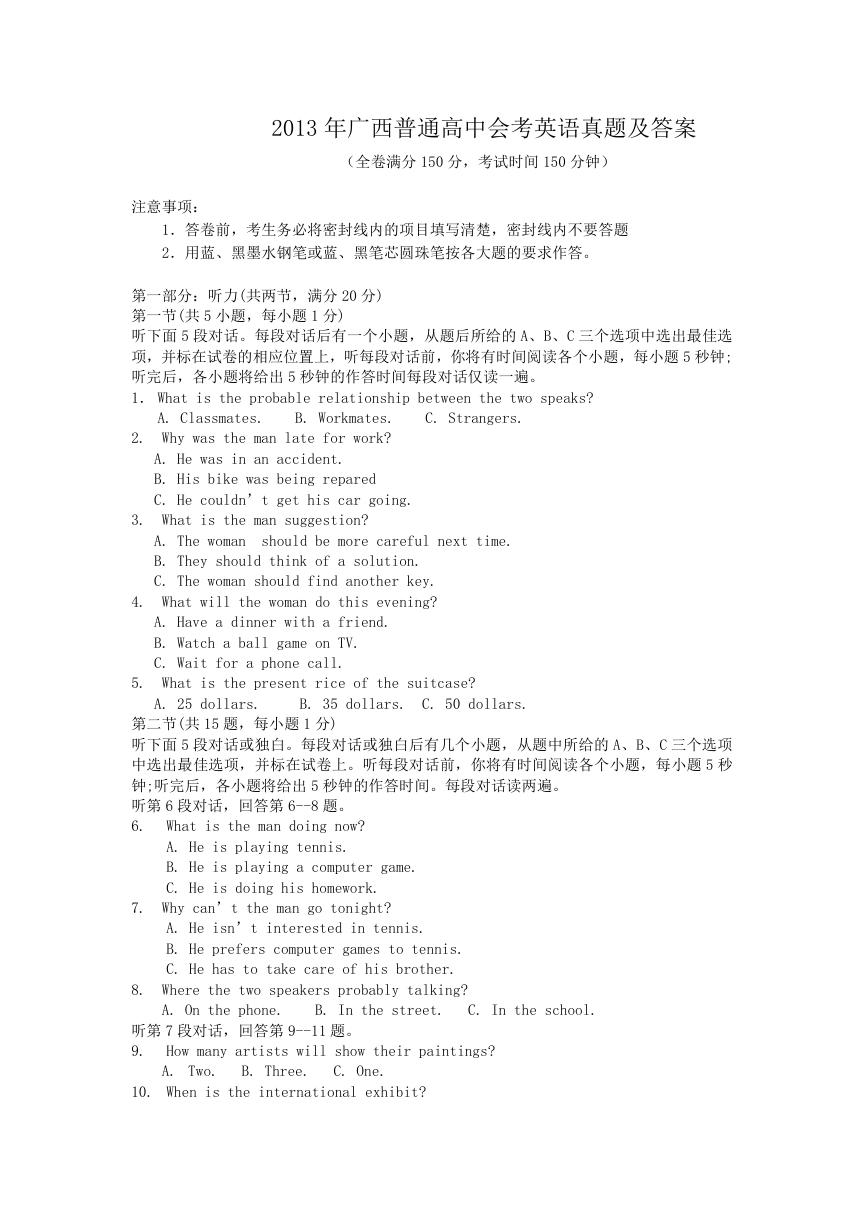



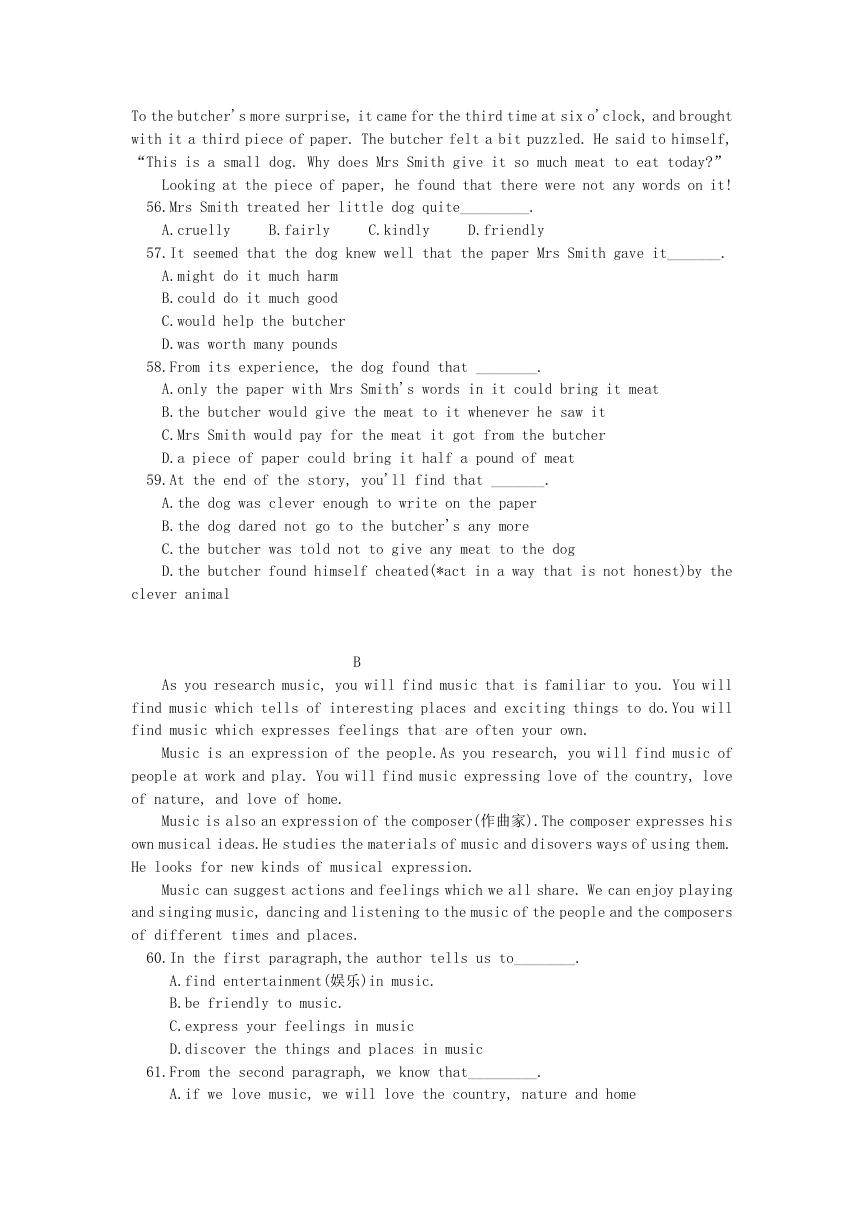
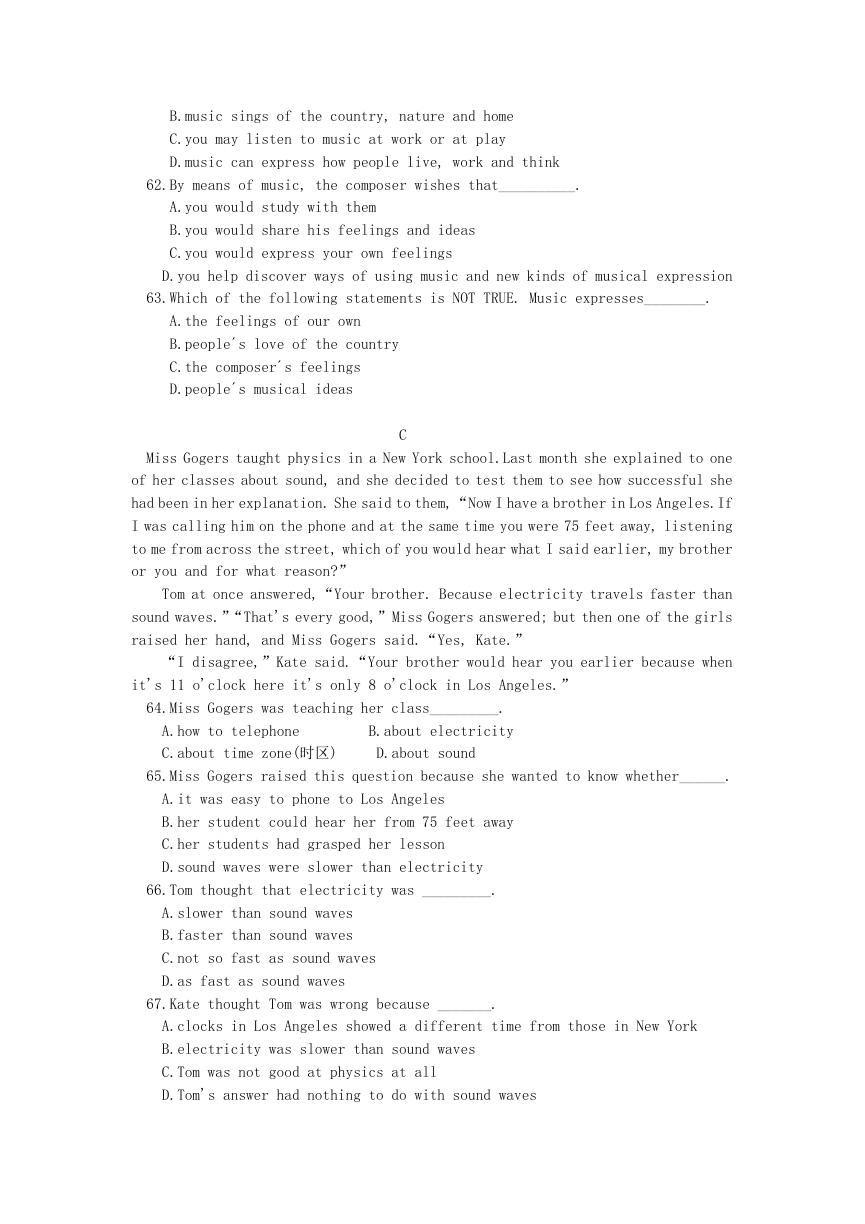
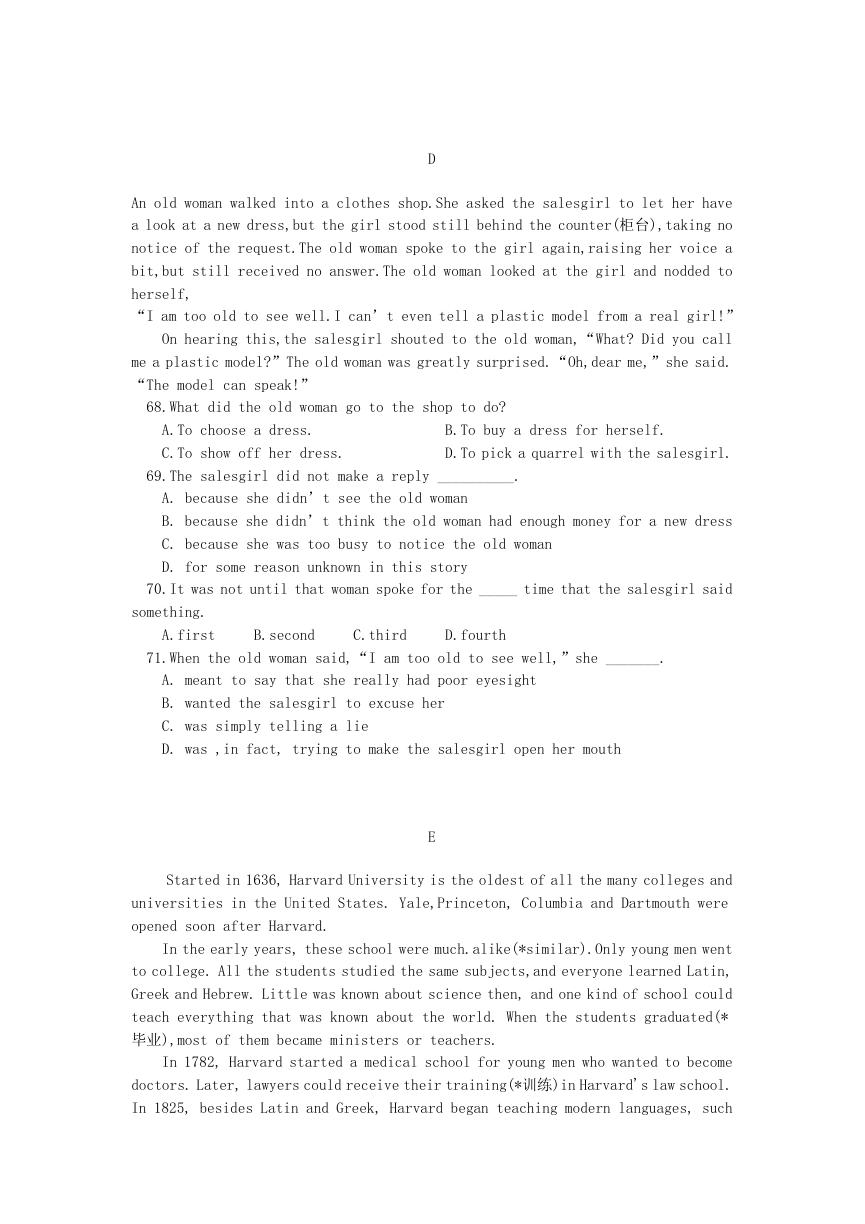
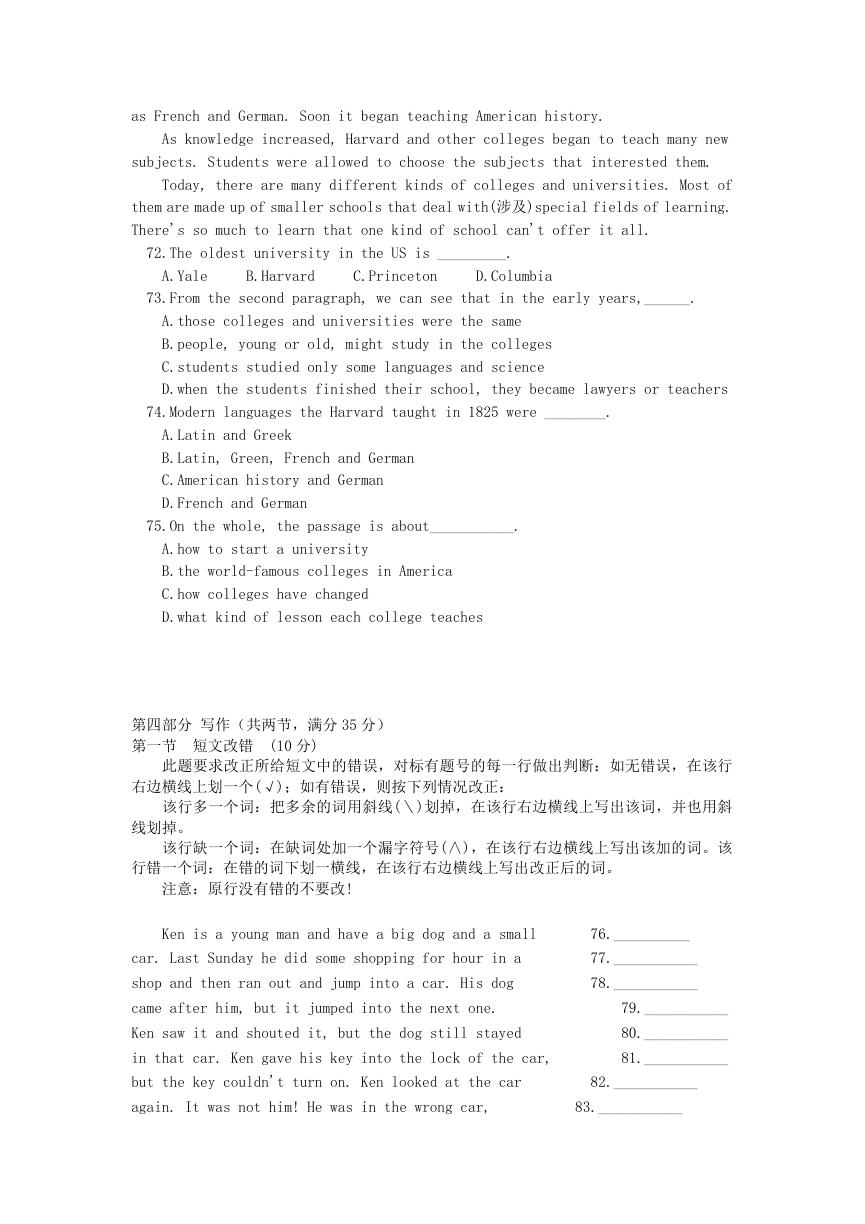








 2023年江西萍乡中考道德与法治真题及答案.doc
2023年江西萍乡中考道德与法治真题及答案.doc 2012年重庆南川中考生物真题及答案.doc
2012年重庆南川中考生物真题及答案.doc 2013年江西师范大学地理学综合及文艺理论基础考研真题.doc
2013年江西师范大学地理学综合及文艺理论基础考研真题.doc 2020年四川甘孜小升初语文真题及答案I卷.doc
2020年四川甘孜小升初语文真题及答案I卷.doc 2020年注册岩土工程师专业基础考试真题及答案.doc
2020年注册岩土工程师专业基础考试真题及答案.doc 2023-2024学年福建省厦门市九年级上学期数学月考试题及答案.doc
2023-2024学年福建省厦门市九年级上学期数学月考试题及答案.doc 2021-2022学年辽宁省沈阳市大东区九年级上学期语文期末试题及答案.doc
2021-2022学年辽宁省沈阳市大东区九年级上学期语文期末试题及答案.doc 2022-2023学年北京东城区初三第一学期物理期末试卷及答案.doc
2022-2023学年北京东城区初三第一学期物理期末试卷及答案.doc 2018上半年江西教师资格初中地理学科知识与教学能力真题及答案.doc
2018上半年江西教师资格初中地理学科知识与教学能力真题及答案.doc 2012年河北国家公务员申论考试真题及答案-省级.doc
2012年河北国家公务员申论考试真题及答案-省级.doc 2020-2021学年江苏省扬州市江都区邵樊片九年级上学期数学第一次质量检测试题及答案.doc
2020-2021学年江苏省扬州市江都区邵樊片九年级上学期数学第一次质量检测试题及答案.doc 2022下半年黑龙江教师资格证中学综合素质真题及答案.doc
2022下半年黑龙江教师资格证中学综合素质真题及答案.doc